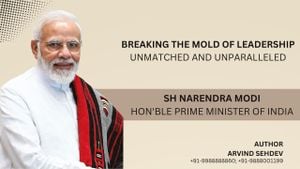Debate surrounding the far-right Alternative for Germany (AfD) has reached new heights as over 100 parliamentarians have backed a formal bid to have the party banned. This effort is spearheaded by CDU member Marco Wanderwitz, who has long advocated for action against what he perceives as the party's extremist tendencies.
The proposal for the ban was officially filed with Bundestag President Bärbel Bas, and it has gained traction, now boasting signatures from 113 lawmakers spanning various political factions. A group of 37 representatives initially prepared the document, seeking judicial review from the Federal Constitutional Court to determine whether the AfD operates outside the bounds of Germany's democratic principles.
This initiative is rooted deeply within the framework of Article 21 of Germany's Basic Law, which allows for the banning of political parties deemed to be working against the constitution. Critics of the AfD argue it engages aggressively with anti-democratic sentiments, thereby necessitating legal scrutiny. The Federal Office for the Protection of the Constitution has tagged the party as being under suspicion for extremism, asserting the need for vigilance against its rhetoric which they deem threatening to fundamental democratic values.
Wanderwitz, familiar with the political terrain, has expressed urgent calls for the process to advance swiftly, ideally before the upcoming federal elections set for February next year. He emphasized the importance of initiating discussions within the current legislative session to prevent any delays. Despite his optimism, it's yet unclear whether there will be enough parliamentary backing to carry the proposal through to fruition.
Martina Renner, from the Left Party and supporter of the move, noted all lawmakers except those affiliated with the AfD have been notified via email, soliciting their approval. The communications highlight the serious nature of the accusations against the AfD, describing its actions as fundamentally unfriendly to the Constitution and democracy.
Central to the case against the AfD is its alleged historical pattern of undermining key constitutional principles, including the dignity of individuals and anti-discrimination laws. The claim is made stronger by instances where the party is accused of compromising the rights of marginalized communities, including minorities and those with disabilities, all under the guise of promoting purportedly “national” interests.
With the parliamentary inquiry underway, dissenting voices within the Bundestag have emerged. Supporters of the AfD firmly reject the allegations, asserting their opposition is fully within the rights afforded by Germany’s democratic structures. They argue the current legislative actions amount to undue political repression, citing the need for political diversity.
Lookaheads to the future suggest the political climate may shift, especially with the elections looming. The interplay between the AfD's rise and actions taken against it could shape the next phase of German politics significantly. Voter sentiment, already polarized, will play a pivotal role as the parties head toward the polls, with the AfD positioned as the second strongest political force.
Legal experts have weighed the practicality of this ban. The chances of success hinge on evidence proving the party’s unconstitutional approach. Many stress the challenge lies not just with parliamentary approval, but also the necessity for substantial proof to sway the Federal Constitutional Court's judgment.
Arguments opposing the proposed ban highlight the importance of preserving freedom of speech and political discourse. Political commentary and public opinion on this matter continue to diverge, with advocates on both sides passionately presenting their case.
Wanderwitz, alongside supporters, urges the Bundestag to act before the electoral deadlines to cement constitutional protections effectively. Whether the concourse for debating and voting occurs remains uncertain as political maneuvers intensify.
While some parties, particularly the Greens, show strong support for the ban, internal rifts appear within the coalition, with critics demanding the pursuit of thorough legal assessments before pushing forward.
What lies at stake here is not just the future of the AfD, but also the larger discourse surrounding democratic practices and the limits of political speech. The legal process initiated against the AfD sets the stage for broader discussions on extremism, the constitution, and the health of the German democracy.
Observers critically note how this situation mirrors historical precedents where parties deemed to be outside the democratic paradigm were brought to trial. The political and legal ramifications of this initiative are bound to echo far beyond the upcoming elections.
Now, as the political scene brims with anticipation, the eyes of the nation remain fixed on the Bundestag and the dialogues surrounding the AfD. It is not merely about banning a party; it is about affirming and safeguarding democratic values, ensuring the system resists any threats it may face.



